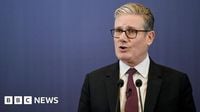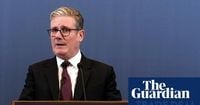On October 9, 2025, a remarkable diplomatic breakthrough was announced: Israel and Hamas had agreed to the first phase of a ceasefire, a move widely credited to the leadership of US President Donald Trump. The agreement marks the start of a 20-point peace plan, and has been hailed across the political spectrum as a moment of profound relief after years of conflict, bloodshed, and humanitarian crisis in Gaza.
UK Prime Minister Sir Keir Starmer, speaking from Mumbai on the final day of a trade visit to India, was unequivocal in his praise for Trump’s role. "This is a very significant step forward and it would not have happened without President Trump's leadership on this," Starmer told reporters, according to BBC. He went on to emphasize the UK’s own contribution: "I want to be really clear about that and I say that from the informed position of the UK having played a part behind the scenes in this with the US and with the mediators."
The ceasefire comes two years and two days after the devastating Hamas-led attack on southern Israel on October 7, 2023, which left about 1,200 people dead and 251 others taken hostage. The toll of the war since then has been staggering, with tens of thousands of lives lost in Gaza and countless families torn apart. For many, the announcement of the ceasefire has brought a glimmer of hope after a long period of darkness. As Starmer put it, the deal represents "a moment of profound relief that will be felt all around the world."
But while the ceasefire’s announcement has been met with celebration—scenes in Tel Aviv’s Hostage Square saw people waving US flags and dancing in the streets—significant challenges remain. The agreement, as unveiled by Trump last week and accepted by Israel with partial agreement from Hamas, covers only part of the ambitious 20-point peace plan. Notably, the thorny issue of Hamas’ disarmament remains unresolved. Hamas has long maintained it would only lay down arms if a Palestinian state were established, leaving a crucial component of the peace plan still up in the air.
The UK’s diplomatic role has been substantial, if deliberately understated. Starmer noted that Britain "played an important part behind the scenes," working alongside the US and a coalition of mediators that included Egypt, Qatar, and Turkey. In his statement, Starmer extended gratitude for the "tireless diplomatic efforts" of these nations and called for the agreement to be "implemented in full, without delay, and accompanied by the immediate lifting of all restrictions on life-saving humanitarian aid to Gaza." He was clear that "all parties" must meet their commitments to end the war and lay the groundwork for a just and lasting peace.
Foreign Secretary Yvette Cooper wasted no time in moving to the next phase, flying from Northern Ireland to Paris to attend a high-level meeting led by French President Emmanuel Macron. The gathering included representatives from Germany, Spain, Egypt, Qatar, Saudi Arabia, the United Arab Emirates, and Jordan—all nations with a stake in the region’s stability. Cooper told reporters the talks focused on ensuring the ceasefire holds, hostages are released, and humanitarian aid is swiftly restored. "Different nations [are] coming together to show our strong support for President Trump's initiative," she said. Cooper was also unequivocal about Hamas’ future: "There would be no role for Hamas in the future governance of Gaza, as a result of the anguish that we've seen over the past two years and the importance of building a lasting peace."
The diplomatic choreography behind the scenes has drawn comparisons to the Good Friday Agreement, which brought peace to Northern Ireland. Jonathan Powell, who played a key role in those historic talks, has been involved in recent negotiations in Egypt, focusing on how to prevent Hamas from playing a role in Gaza’s future. According to BBC, these efforts have been instrumental in shaping the current deal, though much remains to be done.
Back in the UK, the ceasefire deal has drawn widespread—if cautious—praise across the political spectrum. Conservative Leader Kemi Badenoch applauded Trump, saying he "deserves credit for brokering this deal, with the support of Arab partners and Turkey." She described the agreement as "hugely welcome" and an "enormous relief to the families of Israeli hostages, so cruelly captured by Hamas two years ago," while calling on Hamas to "fully disarm and return all hostages." Liberal Democrat leader Sir Ed Davey echoed the sentiment, calling the ceasefire "real hope" and urging that it be "the first step towards a two-state solution and a lasting peace." Reform UK leader Nigel Farage, a longtime Trump ally, posted on social media: "Huge congratulations to President Trump and his team. Real progress between Israel and Hamas is a great achievement."
Despite the accolades, Starmer notably sidestepped the question of whether Trump should receive the Nobel Peace Prize, a long-held ambition of the US president. "What matters now is to press on and implement this … my focus now is moving this from the stage it’s at now … and make a success of this, because that matters to me more than anything else," Starmer said. He emphasized that lasting peace would be the true measure of the deal’s success.
Starmer’s visit to India, while dominated by the Gaza ceasefire news, also saw significant developments on other fronts. The UK and India finalized a £350 million defense agreement for missiles to be used by the Indian army, and Starmer engaged in talks about digital ID systems, trade, human rights, and India’s ongoing energy relationship with Russia. He raised the case of Jagtar Singh Johal, a British Sikh activist held in India without trial for nearly eight years, underscoring the UK’s commitment to consular cases even as progress remains slow.
Looking ahead, Starmer hinted at a future trade-focused trip to China, though he was quick to clarify that a trade deal with China was not currently on the agenda. "Our position is to cooperate where we can, challenge where we must, and that’s been the consistent policy of the government in relation to China," he said.
As the world watches the fragile ceasefire unfold, the focus has shifted from diplomatic wrangling to the urgent task of implementation. The deal offers a rare chance for peace in a region scarred by decades of violence, but its success will depend on the willingness of all parties to honor their commitments and address the unresolved issues—most notably the future of Hamas and the path to a sustainable two-state solution. For now, though, families on both sides of the conflict can dare to hope for a future without war.


